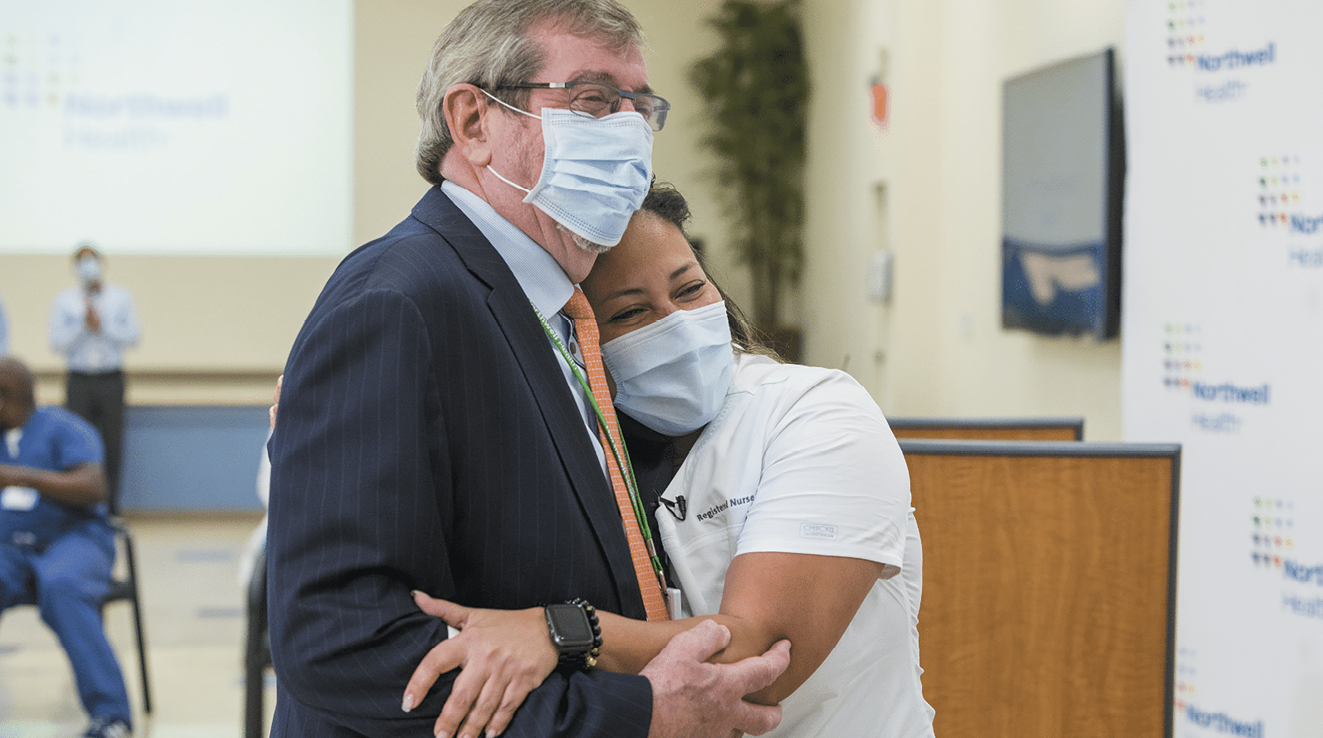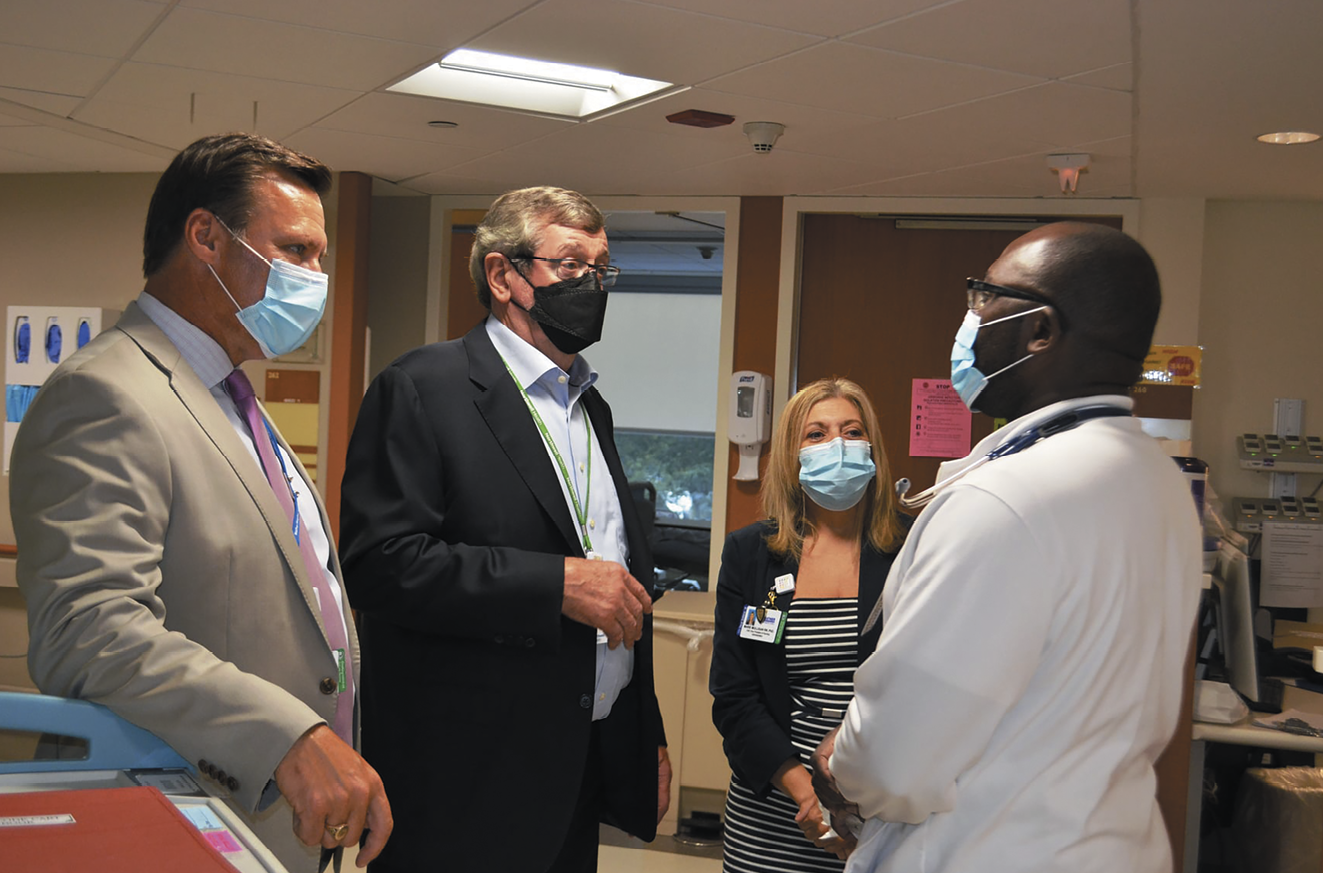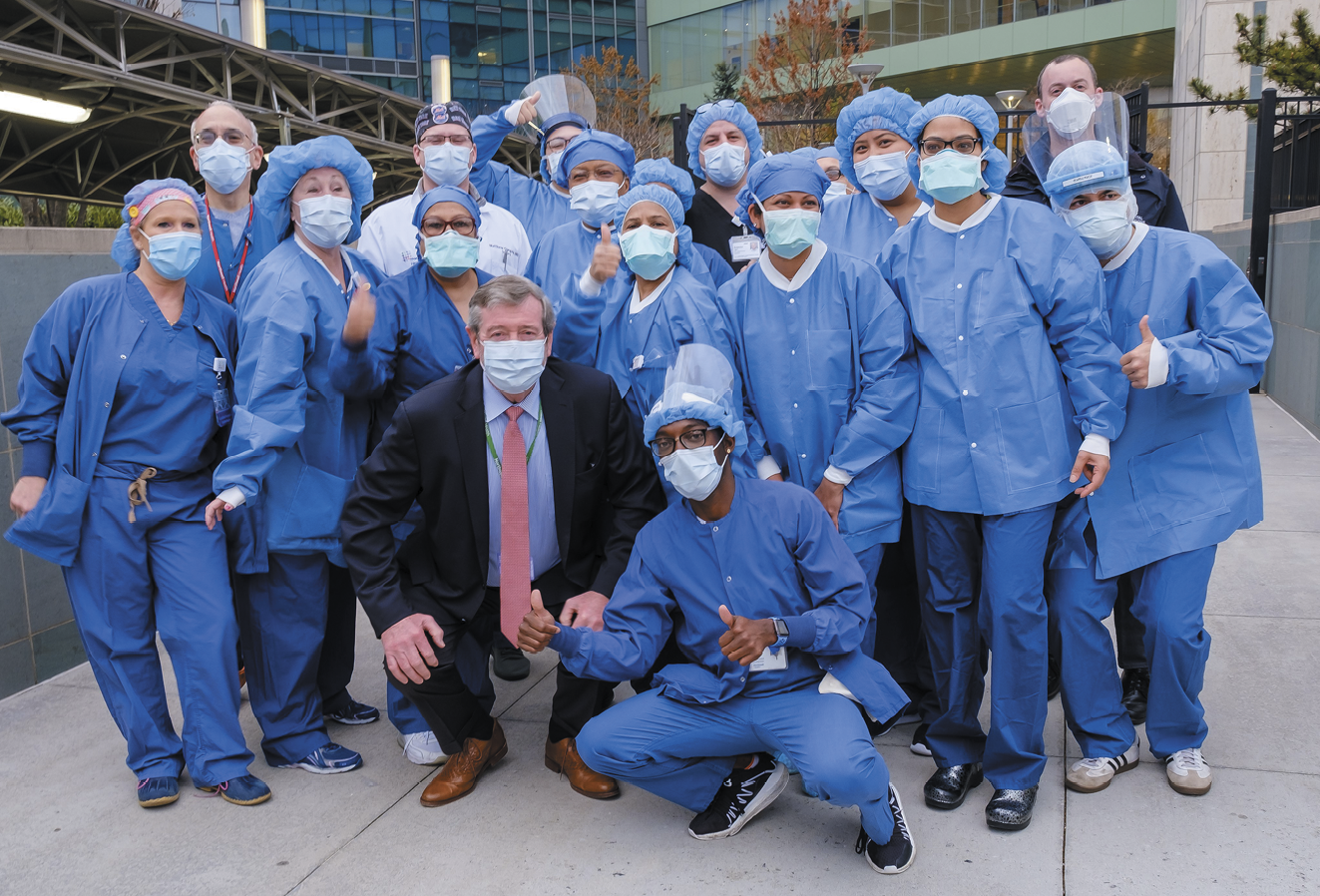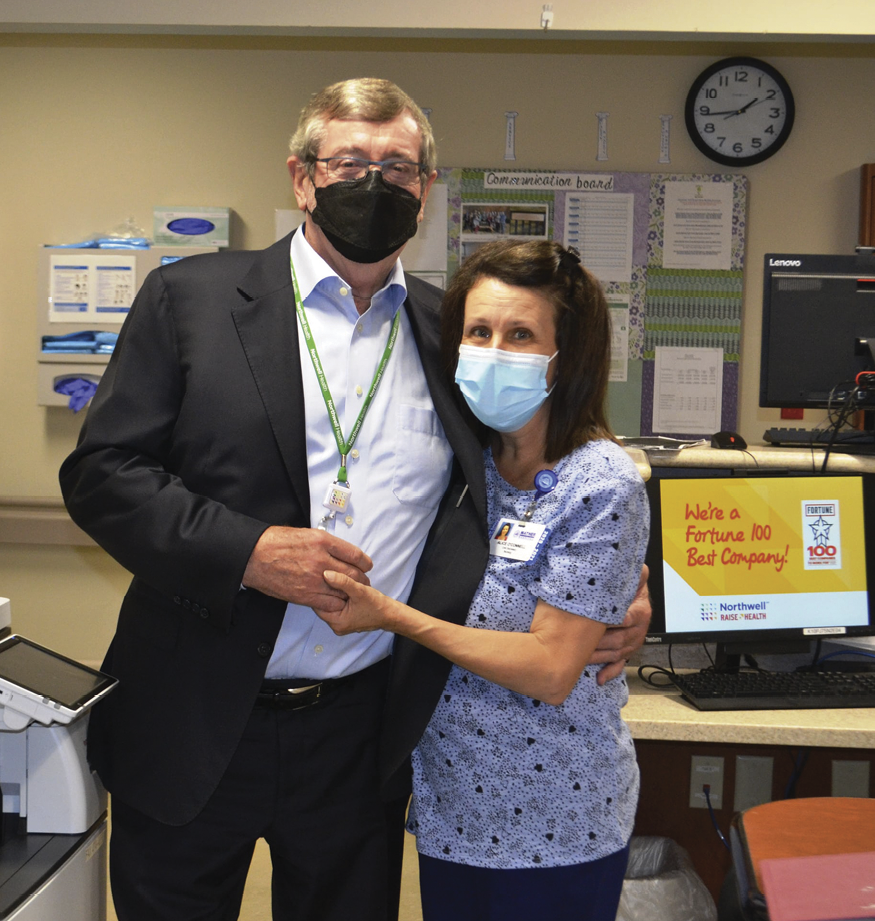- Home
- Media Kit
- MediaJet
- Current Issue
- Past Issues
- Ad Specs-Submission
- Reprints (PDF)
- Photo Specifications (PDF)
- Contact Us
- PRIVACY POLICY
- TERMS OF USE
![]()
ONLINE
![]()
ONLINE

One Northwell
Editors’ Note
Michael Dowling is one of healthcare’s most influential voices, taking a stand on societal issues such as gun violence and immigration that many health system CEOs shy away from. His leadership has been invaluable to Northwell’s consistent expansion and prominence. In March 2020, he successfully navigated the health system through the first COVID-19 epicenter in the U.S., detailing Northwell’s experiences in a book titled, Leading Through a Pandemic: The Inside Story of Humanity, Innovation, and Lessons Learned During the COVID-19 Crisis. Overall, Northwell treated over 300,000 COVID patients – more than any other U.S. health system.
Prior to becoming CEO in 2002 and joining Northwell in 1995, Dowling served in New York State government for 12 years, including seven years as State Director of Health, Education, and Human Services and Deputy Secretary to the Governor. He was also Commissioner of the State Department of Social Services. Earlier, he was a Professor of Social Policy and Assistant Dean at the Fordham University Graduate School of Social Services and Director of the Fordham campus in Westchester County. Dowling has been honored with many awards and recognitions over the years, including the Ellis Island Medal of Honor, the Presidential Distinguished Service Award for the Irish Abroad, the Alfred E. Smith Award from the American Society for Public Administration, the National Human Relations Award from the American Jewish Committee, and the Foreign Policy Association Medal Award. In 2017, he was selected to serve as the Grand Marshal of New York’s St. Patrick’s Day Parade. In 2022, he was named the most influential leader in healthcare by Modern Healthcare, ranking #1 in its annual list of the “100 Most Powerful People in Healthcare,” making it the 16th consecutive year he was featured.
Dowling is past Chair of the Healthcare Institute and the current Chair of the Institute for Healthcare Improvement (IHI). He is a member of the Institute of Medicine of the National Academies of Sciences and the North American Board of the Smurfit School of Business at University College, Dublin, Ireland. He also serves as a board member of the Long Island Association. He is past chair and a current board member of the National Center for Healthcare Leadership (NCHL), the Greater New York Hospital Association, the Healthcare Association of New York State, and the League of Voluntary Hospitals of New York. Dowling was an instructor at the Center for Continuing Professional Education at the Harvard School of Public Health. He earned his undergraduate degree from University College Cork (UCC), Ireland, and his master’s degree from Fordham University. He also has honorary doctorates from the prestigious Queen’s University Belfast, University College Dublin, Hofstra University, Dowling College, and Fordham University.
Institution Brief
Northwell Health (northwell.edu) is a clinical, academic and research enterprise with a workforce of more than 85,000 and annual revenue of $16.5 billion. Northwell is the largest healthcare provider and private employer in New York State, caring for more than two million people annually through a vast network of more than 890 outpatient facilities, including 220 primary care practices, 52 urgent care centers, home care, rehabilitation, and end-of-life programs, and 21 hospitals. Northwell also pursues pioneering research at the Feinstein Institutes for Medical Research and a visionary approach to medical education highlighted by the Zucker School of Medicine, the Hofstra Northwell School of Nursing and Physician Assistant Studies, and one of the nation’s largest medical residency and fellowship programs.

Michael Dowling visiting with Northwell Health’s
frontline healthcare professionals (above and following)
What have been the keys to Northwell Health’s industry leadership and how do you define the Northwell difference?
As outlined in the introduction, we are a large comprehensive and operationally integrated system. We act as a system. We have all services from birth to end-of-life, which is a unique attribute, along with being the third largest academic institution and having a robust innovative research enterprise. That is all important, but what really defines us, I believe, is our culture – a culture of optimism, a can-do attitude, a willingness to change the status quo, to accept the possibilities of failure as a component of our quest to succeed. We are team-oriented and resilient, with a perpetual winning attitude. We are never fully satisfied. We also understand that we are in the customer service business, constantly striving to meet customer needs and expectations. We do not play the victim. There are challenging situations that occur each day in healthcare. We do not complain. We respond and find solutions. We manage the present and create the future.
Is there one Northwell culture or do the different hospitals within the health system have their own cultures?
I like to define our system as a mosaic – an entity with unique individual parts, but all integrated components of a larger whole. Each component, whether a hospital or an outpatient location, has unique histories and unique cultural characteristics. These individual attributes must be acknowledged and appreciated, and in some cases enhanced. But they are all part of Northwell and its overall system-wide culture as outlined in the previous question. It’s a careful medley of the two – the local and the system, but with the clear understanding that we are one – in mission, focus, responsibility, and mode of operation. We are all Northwell.

Many in healthcare use the word patients, but you use the word customers. Will you discuss this difference?
This issue, as I am well aware of, can be controversial. One of the wonderful changes over the past decade or so is that patients who once were placid and subservient in a provider’s presence are now more demanding and more knowledgeable. They are armed with more data, have higher expectations, and shop around. They are becoming customers/consumers and that is a good thing. But it requires that our organization accept and acknowledge it and behave differently. We must respond to this new reality by raising our expectations and changing our operational structures to deal with issues of access, service, and the overall experience of care. Henry David Thoreau once stated, “It’s not what you look at that matters, it’s what you see.” I see consumers, not just patients. I see our responsibility extending to how we meet the needs of our customers, family members, visitors, and friends. Furthermore, most of the letters or communications I receive come not from the patients themselves, but from family members and friends who are also customers of our facilities.
“Northwell is the second largest provider of mental health services in New York State, and we continue to expand our efforts in the inpatient setting, in the community, and in local schools.”
How do you define health?
I define health very broadly. Health is much more than the delivery of medical care. Health is impacted by your environment, by your behaviors (e.g., smoking), by having a job, by nutrition, by seeing what possibilities exist for a better future. It’s multi-faceted. If you desire to be a leader in healthcare, with the goal of improving health, you need to be an influence and catalyst in trying to positively affect as many of these factors as possible.
This is the reason we at Northwell are heavily engaged in a variety of initiatives, many of which have received national recognition. For example, gun violence, which is the leading cause of death for adolescence; sustainability and climate change; food quality/food service – our food services are led by Michelin star chefs; educational opportunity for high school students; veterans care, etc.
The list is long and while there are often limits to what we can do directly, we can be catalysts in getting other individuals and organizations involved. Such partnerships are important. Our responsibilities and obligations as leaders are to raise health in our communities and make the future a better place for kids.

Northwell has also been a leader in addressing the mental health crisis. Will you highlight these efforts?
This is one of the biggest issues we face – all of us. The problem is accelerating, especially among the young. According to many studies, those born after 1995 have the highest rate of anxiety, depression, and suicide of any population cohort ever studied and much of this is connected to social media. Northwell is the second largest provider of mental health services in New York State, and we continue to expand our efforts in the inpatient setting, in the community, and in local schools. We use technology (tele-psych) to reach as many individuals as possible and we partner with local-based organizations.
The stigma associated with mental health is decreasing somewhat, but still is a barrier. I wish we could find a better term to describe the diagnosis. It also needs enhanced funding. Most services are paid by the government, but the reimbursement is woefully low, resulting in substantial losses to providers.
“Each and every day, not just during a crisis like COVID, healthcare employees do extraordinary work. Lives are saved, families are reunited, life is prolonged, and hope is enhanced.”
Will you discuss the impact that the medical school and nursing school have made for Northwell Health?
The schools have been incredibly successful, not only in what they do, but in how they do it. The curriculum is innovative and unique. All medical students, for example, are trained as EMTs in the first nine weeks – they ride our ambulances and participate in treating patients from the beginning. They learn by doing, by being out in the community, witnessing the circumstances that patients and families live in. It enhances their knowledge and evolves their perspective on the true meaning of health. We are educating the doctors and nurses of the future. We broke with tradition and the status quo in redefining nursing and medical education.
Both schools have elevated the organization, enhanced our brand, and our ability to recruit the best practitioners and researchers. It’s a win-win. We are continuing to innovate, change, and evolve. We are now pursuing new ways to adapt to the circumstances of the future that are ever-changing. We will lead, not follow.

How did your upbringing impact the way you view resilience and leadership?
We are shaped, to some extent, by our backgrounds and the environment in which we are raised – and I don’t think we should ever forget where we came from. My upbringing has definitely influenced me and despite difficult circumstances, the overall impact has been positive. I understand poverty and not having the material things that so many now take for granted. I can relate to people in need which is an important perspective to have in the business that I am in. It builds resilience, grit, adaptability, and teaches the power of persistence. I don’t believe in playing the victim and reject the notion of entitlement. Hard work is essential to success. I also played competitive sports, which teaches the importance of collaboration and teamwork.
I have been fortunate in having a varied career. Being in academia enhanced my understanding of the importance of creating a culture of continuous learning. My 12 years in government provided a broad perspective on the multiplicity of factors that impact health. I have also benefited enormously from all those that I have worked with. Every relationship, if appreciated properly, enhances one’s education and knowledge. I have also understood the importance of luck – being in the right place at the right time – but only if you are open enough to take advantage of it.
I have been lucky, and I thank all those who helped and inspired me along the way. I often ask audiences, including employees, “what motivates you?” Is it status, income, title, power, or is it the opportunity to make a positive difference? The answer helps define you.
Healthcare workers received recognition for their work and selflessness during the pandemic. How important is it that the awareness and appreciation for the critical work being done in the profession day in and day out does not get lost?
Each and every day, not just during a crisis like COVID, healthcare employees do extraordinary work. Lives are saved, families are reunited, life is prolonged, and hope is enhanced. They are the soldiers in our defense against ill-health and chronic illness. They educate the practitioners of the future; they discover new treatments and therapies – everyone from the frontline staff to the C-suite.
They deserve constant appreciation. All will eventually need their help – we are all future patients and customers. I take 30 frontline employees to dinner each month. The purpose – to say thank you.![]()